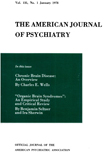THE NURSE'S ROLE IN INDIVIDUALIZING THE ADMISSION PROCESS IN A PSYCHIATRIC HOSPITAL
Abstract
We have described briefly some results of an experiment in which a patient-centered nursing approach was found to be effective in helping patients being admitted to a mental hospital. We believe admission is a crucial time for the patient, and therefore a very important time for help to be given. Since nurses traditionally play a big part in admitting patients, it is important for them to use this opportunity to give help. Moreover, we suspect that the implications of a helpful admission experience extend beyond the admission period.
One of the patients who was helped by the experimental nurse illustrates this point. The study design formally ended the contact between experimental nurse and patient when the admission period was over. But during subsequent days and weeks, this patient consistently sought the nurse— sometimes telling her how well she was feeling, sometimes bringing problems. It seems logical that the patient whose first impression of the nurse was that of a concerned and helpful person would be better able to seek her assistance when she needed it throughout her hospitalization. The first helpful contact between nurse and patient facilitates subsequent helpful contacts. Thus the nurse's work is easier and the patient's care better.
Access content
To read the fulltext, please use one of the options below to sign in or purchase access.- Personal login
- Institutional Login
- Sign in via OpenAthens
- Register for access
-
Please login/register if you wish to pair your device and check access availability.
Not a subscriber?
PsychiatryOnline subscription options offer access to the DSM-5 library, books, journals, CME, and patient resources. This all-in-one virtual library provides psychiatrists and mental health professionals with key resources for diagnosis, treatment, research, and professional development.
Need more help? PsychiatryOnline Customer Service may be reached by emailing [email protected] or by calling 800-368-5777 (in the U.S.) or 703-907-7322 (outside the U.S.).



